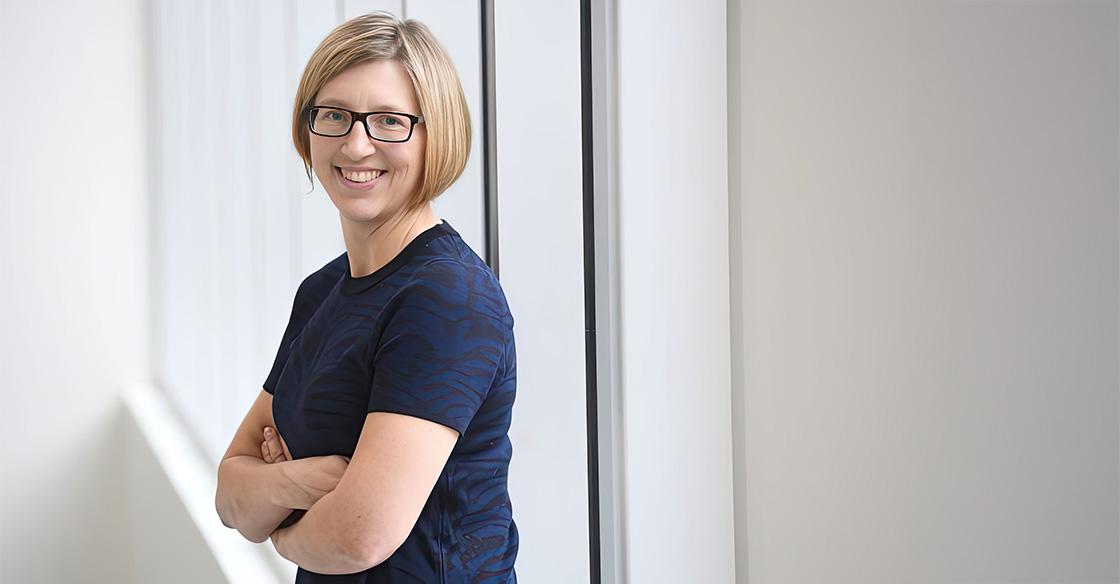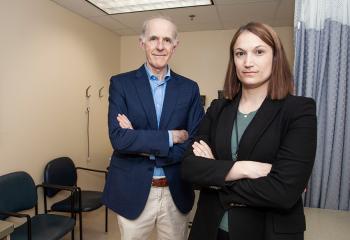
WHY ENDOWED CHAIRS MATTER
Proudly supported by QEII Foundation donors, endowed chairs are among the most prestigious academic appointments – providing researchers with dedicated funding in perpetuity to advance their work. Supported by the investment income alone, endowed chairs ensure that the brightest minds have the resources, stability and time needed to pursue bold ideas and translate discoveries into better patient care.
The Canadian Cancer Society Nova Scotia Division Endowed Chair in Population Cancer Research is a prime example and one of six QEII Foundation endowed chairs. The Canadian Cancer Society Nova Scotia Division Endowed Chair in Population Cancer Research was first established by QEII Foundation donors in the early 2000s, including lead gifts from the Canadian Cancer Society as well as Fred and Elizabeth Fountain. The donor-funded position fuels research that addresses cancer at the population level — focusing not just on treatment, but also on prevention, access, survivorship and the broader systems that help shape health outcomes.
Dr. Robin Urquhart has held the role since 2020, after being named the second-ever chairholder. A QEII affiliate scientist recognized nationally and internationally for her leadership, Dr. Urquhart is harnessing this unique platform to tackle some of the most pressing challenges in cancer care.
Her research is reshaping how we understand survivorship, changing the narrative on lung cancer, and addressing inequities in ovarian cancer care — work that is transforming lives here in Atlantic Canada and across the country.
“Given our unique situation here in Atlantic Canada, I believe funding cancer research is incredibly important,” says Dr. Urquhart. “Compared to the rest of Canada, we have the highest incidence of many of the leading risk factors for cancer, the highest incidence rates for many cancers, and the highest mortality rates for many cancers. The only way we can tackle these challenges is through research. There is no other way.”
SURVIVORSHIP RESEARCH: SUPPORTING LIFE AFTER CANCER
More Canadians are surviving cancer than ever before — a tremendous testament to advancements in early detection and treatment. Yet survival is not the finish line. Many patients continue to experience lasting effects of the disease and its treatment, from fatigue and fear of cancer recurrence to difficulties returning to work or school.
“As the number of Canadians diagnosed with cancer increases, the likelihood that a person will survive cancer has also increased,” explains Dr. Urquhart. “Despite enhanced survival, a diagnosis of cancer and its treatment have substantial late and long-term adverse impacts. In fact, the magnitude of peoples’ medical and supportive care needs after treatment is similar to the magnitude of needs they experience while undergoing cancer treatment.”
Recognizing this gap, Dr. Urquhart is leading several CIHR and Canadian Cancer Society funded projects to develop new, personalized models of follow-up care. These models are designed to address the most common needs of survivors — ensuring patients don’t just live longer, but live better.
In November 2024, she secured a new grant from the Terry Fox Research Institute to expand this work to include people with advanced cancers who are now living longer with disease. This research is redefining what survivorship means, ensuring patients have access to the supports they need at every stage.
CHANGING THE NARRATIVE ON LUNG CANCER
Lung cancer is one of the most fatal cancers, often associated with smoking. But Dr. Urquhart and her team are working to change that perception, shedding light on the significant role of environmental carcinogens.
“Although it is most commonly linked to tobacco use, the incidence of lung cancer is increasing rapidly in people who have never smoked,” says Dr. Urquhart. “In fact, more than 1 in 5 Canadians diagnosed with lung cancer today are never smokers.”
Her pan-Canadian team is leading groundbreaking research on three carcinogens: radon, arsenic and fine particulate air pollution (PM2.5). By analyzing residential exposures alongside biosamples like blood, urine, and toenails, they hope to identify biomarkers that will allow clinicians to more precisely calculate an individual’s lung cancer risk. As Dr. Urquhart explains, the aim is to improve screening criteria, enable earlier detection and, ultimately, save more lives.
Equally impactful is the training component built into this initiative. Twenty-four medical students, graduate students, and post-doctoral fellows are currently working within this team grant, positioning the next generation of cancer researchers to lead future discoveries.
ACCESS TO OVARIAN CANCER CARE
Ovarian cancer remains one of the most difficult cancers to diagnose and treat, with nearly 70 per cent of women diagnosed at advanced stages. Outcomes vary widely across Canada, pointing to troubling disparities in access to care.
“In Canada, among those diagnosed with advanced stage ovarian cancer, three-year net survival rates ranged from 31.9 per cent in Nova Scotia to 38.6 per cent in Alberta,” says Dr. Urquhart. “This data suggests that differences in access to treatment may exist across jurisdictions.”
As part of a project team dedicated to discovering why, Dr. Urquhart is studying variations in diagnostic pathways and treatment in Nova Scotia to uncover where inequities exist and how they affect survival. This research will help inform changes to improve access – ensuring more women receive timely, effective care regardless of where they live.
A LEADER ON A NATIONAL STAGE
While advancing her research programs, Dr. Urquhart also plays a prominent role on the national stage. She is a member of the CIHR Institute of Cancer Research Advisory Board and the Canadian Cancer Society Advisory Council on Research.
As a part of the Marathon of Hope Cancer Centres Network Steering Committee, she’s also no stranger to the impact of philanthropy. QEII Foundation donors generously contributed $250,000 to the Marathon of Hope as part of our We Are campaign to help advance this collaboration through the Atlantic Cancer Consortium. This QEII investment connects Atlantic Canada to a pan-Canadian network laser-focused on accelerating precision medicine, ensuring our region is part of discoveries that will shape the future of cancer care. Dr. Urquhart’s leadership within this initiative — alongside her endowed chair work — showcases how our QEII Foundation donors continue to support her work and impact across multiple national research platforms.
In the past year, she has published 16 peer-reviewed papers, delivered eight invited talks at major conferences, and guided three Master’s students to successful graduation. Her leadership has also been celebrated beyond academia. In 2025, she was named one of Zoomer magazine’s “Canadian Scientists Pushing the Boundaries of Cancer Research” and recognized by the Terry Fox Research Institute as one of five women leading precision medicine in Canada.
QEII FOUNDATION DONORS MAKE IT POSSIBLE
From survivorship research to better understanding lung and ovarian cancer, Dr. Urquhart’s work as the Canadian Cancer Society Nova Scotia Division Endowed Chair in Population Cancer Research is shaping the future of cancer care. Just as importantly, she is cultivating the next generation of scientists, ensuring Atlantic Canada retains and grows its research talent.
“Building capacity in cancer research is fundamental to developing our incredibly gifted ‘home-grown’ talent and to keeping them in our region to build their careers and ensure the research is translated to people who live and work here in our communities,” she says.
Thanks to the support of QEII Foundation donors, that vision is not just possible — it is already underway.
The Canadian Cancer Society Nova Scotia Division Endowed Chair in Population Cancer Research role ensures that Dr. Urquhart and her team have sustained resources to advance their research year after year, supporting both immediate progress and long-term transformation.
“The gifts of donors have allowed me to support trainees and early-career researchers, and to give them the tools they need to succeed,” says Dr. Urquhart. “It has also allowed me to focus on building my research program and work with healthcare system decision-makers to ensure that my research informs cancer services and policies.”
According to Dr. Urquhart, her gratitude to the many QEII Foundation donors who help make her work possible – both through the endowed chair and the many research grants, projects and teams she leads – cannot be understated.
“Donors play a major role in the cancer research ecosystem,” says Dr. Urquhart. “Their support is invaluable to our efforts to control cancer in Canada and, for that, we’re incredibly grateful.”
